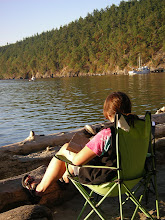Thursday, December 29, 2005
Kiss more (and longer), Drink a Latte
Immersion Journalism
Monday, December 19, 2005
Emerson loves the snow


I like our neighborhood, and that it feels like a house in the woods--with Manito Pond just a few blocks away. And the small, old house is now warmed by an oil-sucking Hercules furnace. I wish there was a more economical and environmentally sound way of heating, but the gas fireplace and space heaters are not much better. The temperature gauge outside the kitchen window currently reads 20 degrees.
"In the woods we return to reason and faith." - Thoreau
Sunday, December 18, 2005
teacher & education blogs
- for a refreshingly and brutally honest account of teaching in the inner city - Mr. Babylon (has a special link to a NY Sun Times article about teachers who blog)
- Education writer Joanne Jacobs
- Why Homeschool
- Get Lost, Mr. Chips - a substitute teacher's blog
* * *
Imagine
Schools where I might enjoy being part of the English/Creative Writing faculty:
* Interlochen Center for the Arts - Michigan: Philosophy..."Interlochen Arts Academy's creative writing program offers students with little or no prior training in literary craft an opportunity to engage in intensive study of both the theory and practice of poetry, fiction, creative non-fiction, playwriting and screenwriting. The goal of the program is to help young writers cultivate their talents, to broaden their command of technique, and to introduce them to both traditional and contemporary masters in various genres. Central to the curriculum are the Workshops and the individual critiques - the former enabling students to meet in small groups to discuss one another's work, the latter bringing individual students into an intensely focused critical discussion with the published, professional writers who serve on the faculty. In addition to both workshop and literature classes, the program brings to campus distinguished writers who work with the students to enhance their studies and to provide them direct contact with the world of contemporary writing."
* The Beacon School - NYC: "The Beacon English Department explores literature through analysis and creative writing. Our purpose is to help our students realize that literature reflects certain universal truths that allow us to see others and ourselves as part of a larger whole. While literature can be understood as a product of the time in which it was written, it is a timeless reflection of life that facilitates discovery and fosters empathy. Because of this, we believe that literature is democratic and humanizing.Students are required to pass eight semesters of English. In each academic year students will be asked to present one project to demonstrate a particular form of composition emphasized during that year. In addition each year at the PBA presentation thestudent will present a creative project that explores literature through the creative process. This can include creative writing and/or non-written projects (such as video, visual art, dance etc.). Whenever possible, a teacher other than the classroom teacher will assess or help assess the portfolio piece. // Creative writing will be emphasized each of the four years." ... The school also has unique sports team--including Ultimate Frisbee, Bowling, and Fencing. Plus fun clubs that reflect the intellectual diversity of the school community: Live Poets Society, End of the Tunnel Press, and The Catalyst (an undgerground poetry magazine) are just a few.
* The School of the Art Institute of Chicago
* a Charter School? . . . unfortunately, Washington State hasn't been successful in establishing these yet. (Another site about the charter school movement in WA, http://www.wacharterschools.org/.)
Wednesday, December 14, 2005
The Bark
An excerpt...
"I’m not a religious person, but trail running with my dogs has helped make me a spiritual one, developing in me a deep, sustaining connection to them and to nature in all her abundant wonder. My senses have become more acute. I’m more aware—of the dogs, the trails, the mountains, the smells, the rhythms of life and the seasons. Running trails brings me a sense of calmness and peace. There’s awe of the natural beauty and the ease with which my dogs and I glide through it, spiced with a keen awareness that something could instantly go wrong and so nothing should be wasted or taken for granted. A metaphor for life. I recently read that some scientists theorize that humans are “hardwired” to accept, and need, God and religion. I suspect my own hardwiring requires that I worship at the church of nature and dogs, where services occur while running with them on wooded trails. "
Tuesday, December 13, 2005
Rehab, Holden, and The Scarlet Letter
Well, for the past three weeks I've had the interesting opportunity to be a "guest teacher" (the new term for "substitute") for an English teacher at a local high school, due to her being in rehab. For alcohol. Further proof that it's a stressful profession.
Week 1 was a scramble, as there were no lesson plans, no attendance sheets, no gradebook or planning book...nothing to give me a clue as to what the teacher's goals and expectations were for the class. (Previous to me arriving, there were 8 different substitutes in and out.) Even the AP class didn't receive a syllabus! I got a little help from some of the other teachers, and the dept. head (who was there on my 1st/2nd day) then has been gone since due to her own health situation--totally not related to rehab or anything.
While the AP kids have been working on and now finally giving group presentations on The Scarlet Letter, I've managed to scrounge up materials either found in messy file drawers or random drawers (the poor teacher was totally unorganized, reflective of her downward alcoholic slide) to at least help with curriculum for The Catcher in the Rye. It's one of my favorite novels to teach; however, my files (and marked up copy of the book) is in storage at my parents 300+ miles away. So I've resorted to using basic comprehension questions the teacher had in a file (which I only finally found on day 4).
The district, unfortunately, uses ability grouping for their English classes. And according to Myles I. Friedman's book No School Left Behind: How to Increase Student Achievement, this is one of the things that schools are NOT supposed to do. So 5 and 6th periods is "Integrated Communications"--seniors who have either failed the regular ("College Prep") course the previous year(s), or who chose the course (or it was chosen for them by a counselor) either because:
a) didn't want a challenging English class/don't care about going to college
b) is ESL
c) can't read/write
d) a and c
Despite the handful of respectful, cooperative, genuine nice kids, there is an obnoxious group of 3 or so boys (it's always the boys..17/18 yr old high school boys are an odd breed...one is even 18-1/2, will be 19 in May and he says he's coming back next year b/c he can't pass any classes) in each class. They put cell phones in their crotch (to hide them from me), throw empty plastic water bottles across the room to the garbage (and miss), ask to go to the bathroom every day, don't bring their book, refuse to use one available for loan, and are kids that don't have jobs outside of school because they are not skilled enough, nor professional enough to even follow instructions and complete tasks, provide cordial customer service, and respect a boss. I'm not being cynical. I'm admitting the reality. I'm done being an idealist teacher. That would be so "first year teacher"! I taught them a new word today: asinine.
As in, "It is asinine to throw a pencil across the room at your friend."
It's a weird world there. And of course, being a "sub" (despite the work we actually have been doing and the quizzes/work being graded) doesn't allow me the time to build relationships with the students, or establish my own clear boundaries and expectations for behavior (my attempts on day 2 were somewhat helpful, but there was no real way to reverse their habits after a random string of subs and the disorganization and lax accountability they were previously held to).
Other crazy things: someone writing the word "penis" on a window with lip gloss, a snowball thrown across the room (by the almost-19-yr-old, who also wears red eyeliner and a fur-lined green plaid coat), and a kid freaking out because he didn't want to sit in his assigned seat. Like, freaking out and yelling obscenities.
So other than having a room of semi-Holdens (except they aren't passing English), there are a couple classes of College Prep juniors and we've been going through Transcendentalist writers who are in their glossy 4" thick American Lit. textbook. Emerson's "Self-Reliance" and "Nature", tomorrow some "Walden" excerpts. Unfortunatly, their writing skills are pretty weak, so it makes literary analysis questions/responses difficult, because they need so much guidance, coaching, immediate feedback, correcting, and with 30 students with the top 10% who are great writers, then the next 10% who get bored easily waiting for others...well, they have a ways to go to be prepped for college, so good thing they are only 11th graders.
Positive highlights/observations will appear in the next post, for now I can say that this re-introduction back into teaching HS English at a 1,600+ student school, on a 6 period/day schedule has helped me make the decision to not seek a FT position teaching at the secondary level...even if the rehab goes longer.
Friedman excerpts:
“Well educated students are those who know how to think critically, how to solve problems, how to work well collaboratively, and how to innovate. But children must want to learn what they are being taught; they must be active partners with their teachers. Students control what they are willing to learn.”
“In the middle school years, however, schools begin teaching more abstract concepts. Students are less able to see how these concepts help them . . . Learning becomes less interesting, and students become less motivated. From this point on, a student’s success depends largely on the values of the family. If the family places a high value on education, students will force themselves to push through the boredom and irrelevance of their lessons.”




